The Nursing Industry in Australia
VerifiedAdded on 2022/08/13
|8
|1568
|15
AI Summary
The following sections of the paper will discuss the role of key regulatory bodies associated with nursing in Australia, the professionals required for assuring successful nursing provisions and a short reflection on the personal skills on the strength and weaknesses identified in the nursing profession. Australian Nursing Industry According to the annual report provided by the Nursing and Midwifery Board of Australia, the count of registered nurses in 2016/17 was 386,629, a significant increase from 376,086 from the year 2015/16 (Www1.health.gov
Contribute Materials
Your contribution can guide someone’s learning journey. Share your
documents today.
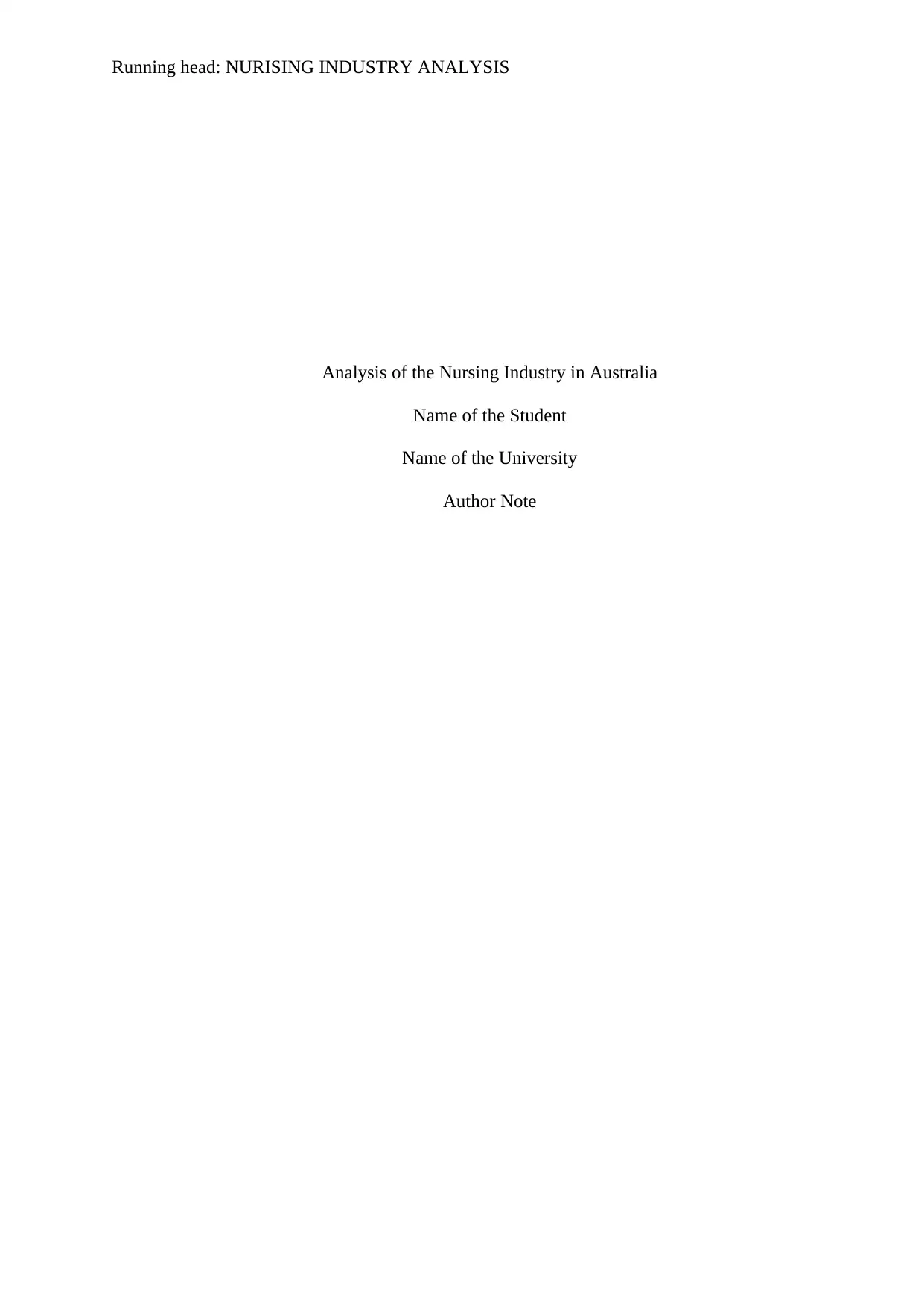
Running head: NURISING INDUSTRY ANALYSIS
Analysis of the Nursing Industry in Australia
Name of the Student
Name of the University
Author Note
Analysis of the Nursing Industry in Australia
Name of the Student
Name of the University
Author Note
Secure Best Marks with AI Grader
Need help grading? Try our AI Grader for instant feedback on your assignments.
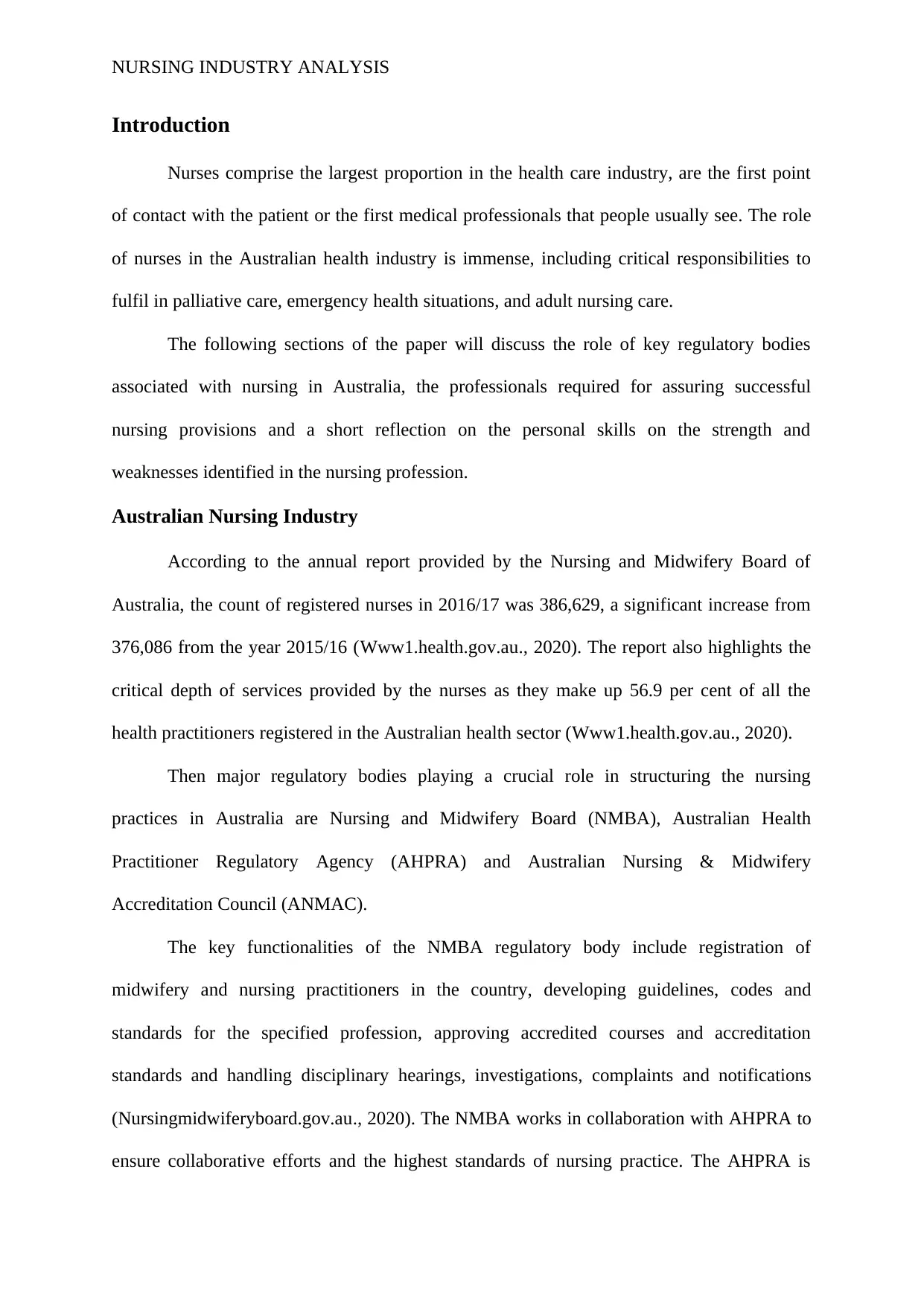
NURSING INDUSTRY ANALYSIS
Introduction
Nurses comprise the largest proportion in the health care industry, are the first point
of contact with the patient or the first medical professionals that people usually see. The role
of nurses in the Australian health industry is immense, including critical responsibilities to
fulfil in palliative care, emergency health situations, and adult nursing care.
The following sections of the paper will discuss the role of key regulatory bodies
associated with nursing in Australia, the professionals required for assuring successful
nursing provisions and a short reflection on the personal skills on the strength and
weaknesses identified in the nursing profession.
Australian Nursing Industry
According to the annual report provided by the Nursing and Midwifery Board of
Australia, the count of registered nurses in 2016/17 was 386,629, a significant increase from
376,086 from the year 2015/16 (Www1.health.gov.au., 2020). The report also highlights the
critical depth of services provided by the nurses as they make up 56.9 per cent of all the
health practitioners registered in the Australian health sector (Www1.health.gov.au., 2020).
Then major regulatory bodies playing a crucial role in structuring the nursing
practices in Australia are Nursing and Midwifery Board (NMBA), Australian Health
Practitioner Regulatory Agency (AHPRA) and Australian Nursing & Midwifery
Accreditation Council (ANMAC).
The key functionalities of the NMBA regulatory body include registration of
midwifery and nursing practitioners in the country, developing guidelines, codes and
standards for the specified profession, approving accredited courses and accreditation
standards and handling disciplinary hearings, investigations, complaints and notifications
(Nursingmidwiferyboard.gov.au., 2020). The NMBA works in collaboration with AHPRA to
ensure collaborative efforts and the highest standards of nursing practice. The AHPRA is
Introduction
Nurses comprise the largest proportion in the health care industry, are the first point
of contact with the patient or the first medical professionals that people usually see. The role
of nurses in the Australian health industry is immense, including critical responsibilities to
fulfil in palliative care, emergency health situations, and adult nursing care.
The following sections of the paper will discuss the role of key regulatory bodies
associated with nursing in Australia, the professionals required for assuring successful
nursing provisions and a short reflection on the personal skills on the strength and
weaknesses identified in the nursing profession.
Australian Nursing Industry
According to the annual report provided by the Nursing and Midwifery Board of
Australia, the count of registered nurses in 2016/17 was 386,629, a significant increase from
376,086 from the year 2015/16 (Www1.health.gov.au., 2020). The report also highlights the
critical depth of services provided by the nurses as they make up 56.9 per cent of all the
health practitioners registered in the Australian health sector (Www1.health.gov.au., 2020).
Then major regulatory bodies playing a crucial role in structuring the nursing
practices in Australia are Nursing and Midwifery Board (NMBA), Australian Health
Practitioner Regulatory Agency (AHPRA) and Australian Nursing & Midwifery
Accreditation Council (ANMAC).
The key functionalities of the NMBA regulatory body include registration of
midwifery and nursing practitioners in the country, developing guidelines, codes and
standards for the specified profession, approving accredited courses and accreditation
standards and handling disciplinary hearings, investigations, complaints and notifications
(Nursingmidwiferyboard.gov.au., 2020). The NMBA works in collaboration with AHPRA to
ensure collaborative efforts and the highest standards of nursing practice. The AHPRA is
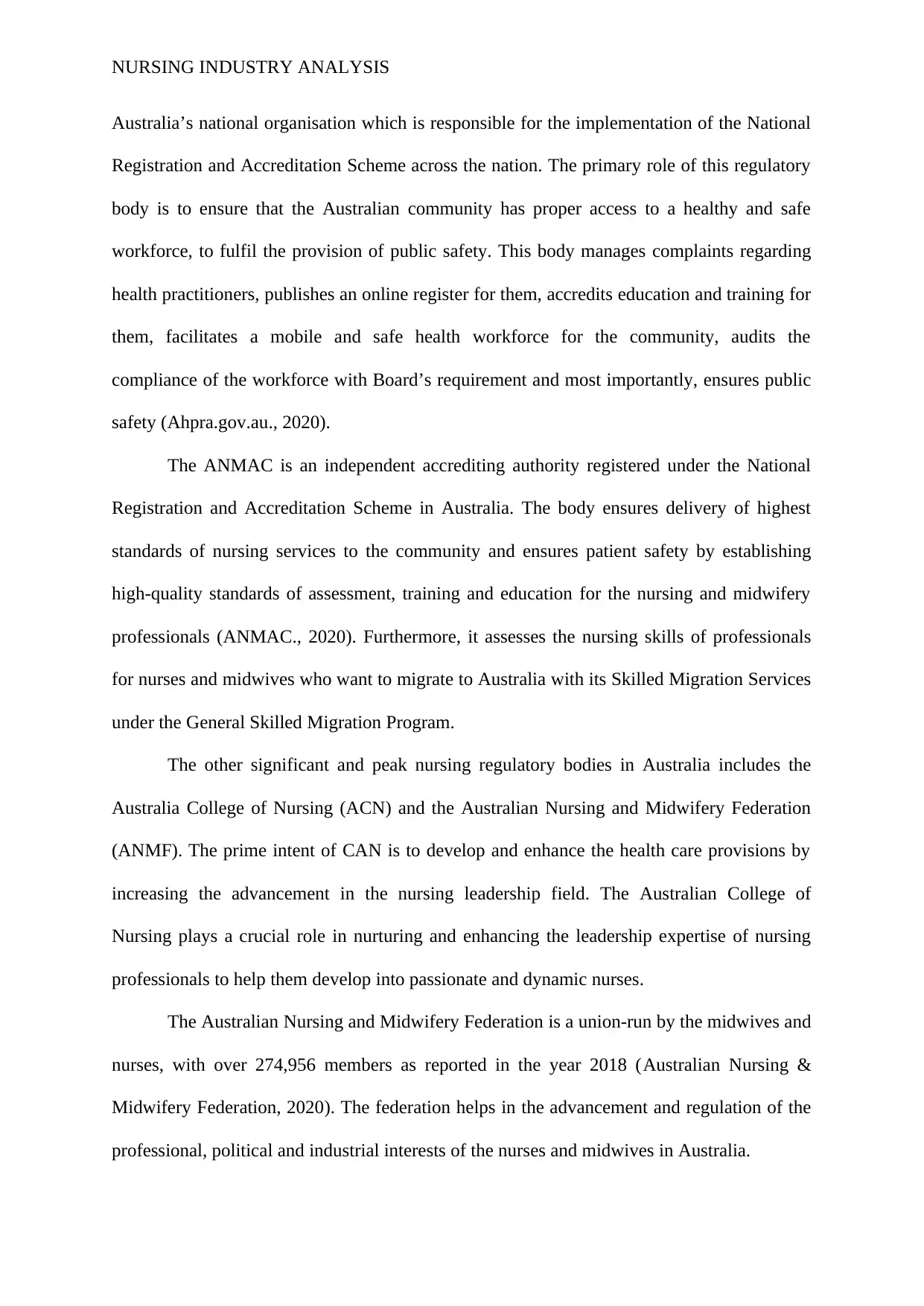
NURSING INDUSTRY ANALYSIS
Australia’s national organisation which is responsible for the implementation of the National
Registration and Accreditation Scheme across the nation. The primary role of this regulatory
body is to ensure that the Australian community has proper access to a healthy and safe
workforce, to fulfil the provision of public safety. This body manages complaints regarding
health practitioners, publishes an online register for them, accredits education and training for
them, facilitates a mobile and safe health workforce for the community, audits the
compliance of the workforce with Board’s requirement and most importantly, ensures public
safety (Ahpra.gov.au., 2020).
The ANMAC is an independent accrediting authority registered under the National
Registration and Accreditation Scheme in Australia. The body ensures delivery of highest
standards of nursing services to the community and ensures patient safety by establishing
high-quality standards of assessment, training and education for the nursing and midwifery
professionals (ANMAC., 2020). Furthermore, it assesses the nursing skills of professionals
for nurses and midwives who want to migrate to Australia with its Skilled Migration Services
under the General Skilled Migration Program.
The other significant and peak nursing regulatory bodies in Australia includes the
Australia College of Nursing (ACN) and the Australian Nursing and Midwifery Federation
(ANMF). The prime intent of CAN is to develop and enhance the health care provisions by
increasing the advancement in the nursing leadership field. The Australian College of
Nursing plays a crucial role in nurturing and enhancing the leadership expertise of nursing
professionals to help them develop into passionate and dynamic nurses.
The Australian Nursing and Midwifery Federation is a union-run by the midwives and
nurses, with over 274,956 members as reported in the year 2018 (Australian Nursing &
Midwifery Federation, 2020). The federation helps in the advancement and regulation of the
professional, political and industrial interests of the nurses and midwives in Australia.
Australia’s national organisation which is responsible for the implementation of the National
Registration and Accreditation Scheme across the nation. The primary role of this regulatory
body is to ensure that the Australian community has proper access to a healthy and safe
workforce, to fulfil the provision of public safety. This body manages complaints regarding
health practitioners, publishes an online register for them, accredits education and training for
them, facilitates a mobile and safe health workforce for the community, audits the
compliance of the workforce with Board’s requirement and most importantly, ensures public
safety (Ahpra.gov.au., 2020).
The ANMAC is an independent accrediting authority registered under the National
Registration and Accreditation Scheme in Australia. The body ensures delivery of highest
standards of nursing services to the community and ensures patient safety by establishing
high-quality standards of assessment, training and education for the nursing and midwifery
professionals (ANMAC., 2020). Furthermore, it assesses the nursing skills of professionals
for nurses and midwives who want to migrate to Australia with its Skilled Migration Services
under the General Skilled Migration Program.
The other significant and peak nursing regulatory bodies in Australia includes the
Australia College of Nursing (ACN) and the Australian Nursing and Midwifery Federation
(ANMF). The prime intent of CAN is to develop and enhance the health care provisions by
increasing the advancement in the nursing leadership field. The Australian College of
Nursing plays a crucial role in nurturing and enhancing the leadership expertise of nursing
professionals to help them develop into passionate and dynamic nurses.
The Australian Nursing and Midwifery Federation is a union-run by the midwives and
nurses, with over 274,956 members as reported in the year 2018 (Australian Nursing &
Midwifery Federation, 2020). The federation helps in the advancement and regulation of the
professional, political and industrial interests of the nurses and midwives in Australia.
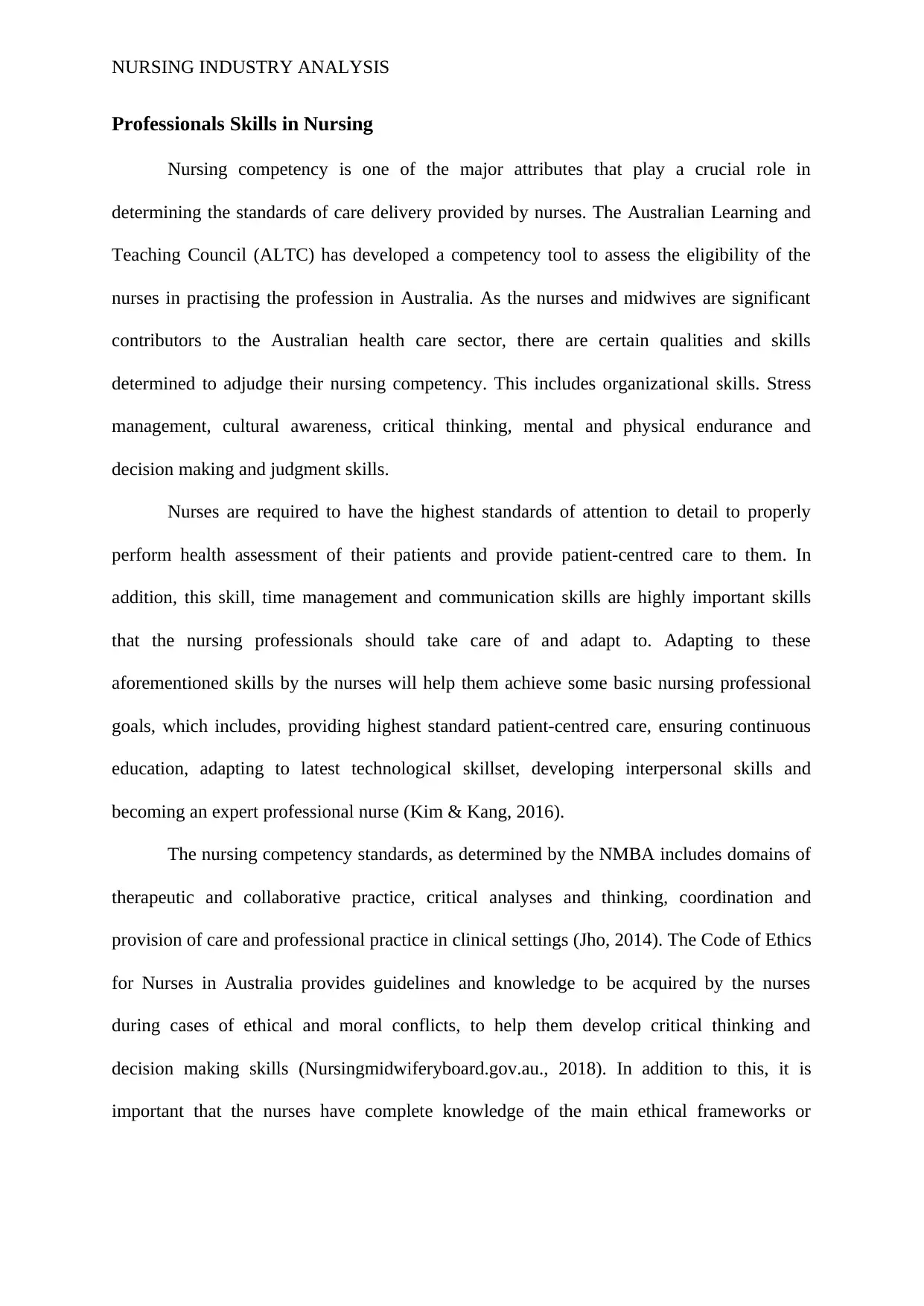
NURSING INDUSTRY ANALYSIS
Professionals Skills in Nursing
Nursing competency is one of the major attributes that play a crucial role in
determining the standards of care delivery provided by nurses. The Australian Learning and
Teaching Council (ALTC) has developed a competency tool to assess the eligibility of the
nurses in practising the profession in Australia. As the nurses and midwives are significant
contributors to the Australian health care sector, there are certain qualities and skills
determined to adjudge their nursing competency. This includes organizational skills. Stress
management, cultural awareness, critical thinking, mental and physical endurance and
decision making and judgment skills.
Nurses are required to have the highest standards of attention to detail to properly
perform health assessment of their patients and provide patient-centred care to them. In
addition, this skill, time management and communication skills are highly important skills
that the nursing professionals should take care of and adapt to. Adapting to these
aforementioned skills by the nurses will help them achieve some basic nursing professional
goals, which includes, providing highest standard patient-centred care, ensuring continuous
education, adapting to latest technological skillset, developing interpersonal skills and
becoming an expert professional nurse (Kim & Kang, 2016).
The nursing competency standards, as determined by the NMBA includes domains of
therapeutic and collaborative practice, critical analyses and thinking, coordination and
provision of care and professional practice in clinical settings (Jho, 2014). The Code of Ethics
for Nurses in Australia provides guidelines and knowledge to be acquired by the nurses
during cases of ethical and moral conflicts, to help them develop critical thinking and
decision making skills (Nursingmidwiferyboard.gov.au., 2018). In addition to this, it is
important that the nurses have complete knowledge of the main ethical frameworks or
Professionals Skills in Nursing
Nursing competency is one of the major attributes that play a crucial role in
determining the standards of care delivery provided by nurses. The Australian Learning and
Teaching Council (ALTC) has developed a competency tool to assess the eligibility of the
nurses in practising the profession in Australia. As the nurses and midwives are significant
contributors to the Australian health care sector, there are certain qualities and skills
determined to adjudge their nursing competency. This includes organizational skills. Stress
management, cultural awareness, critical thinking, mental and physical endurance and
decision making and judgment skills.
Nurses are required to have the highest standards of attention to detail to properly
perform health assessment of their patients and provide patient-centred care to them. In
addition, this skill, time management and communication skills are highly important skills
that the nursing professionals should take care of and adapt to. Adapting to these
aforementioned skills by the nurses will help them achieve some basic nursing professional
goals, which includes, providing highest standard patient-centred care, ensuring continuous
education, adapting to latest technological skillset, developing interpersonal skills and
becoming an expert professional nurse (Kim & Kang, 2016).
The nursing competency standards, as determined by the NMBA includes domains of
therapeutic and collaborative practice, critical analyses and thinking, coordination and
provision of care and professional practice in clinical settings (Jho, 2014). The Code of Ethics
for Nurses in Australia provides guidelines and knowledge to be acquired by the nurses
during cases of ethical and moral conflicts, to help them develop critical thinking and
decision making skills (Nursingmidwiferyboard.gov.au., 2018). In addition to this, it is
important that the nurses have complete knowledge of the main ethical frameworks or
Secure Best Marks with AI Grader
Need help grading? Try our AI Grader for instant feedback on your assignments.
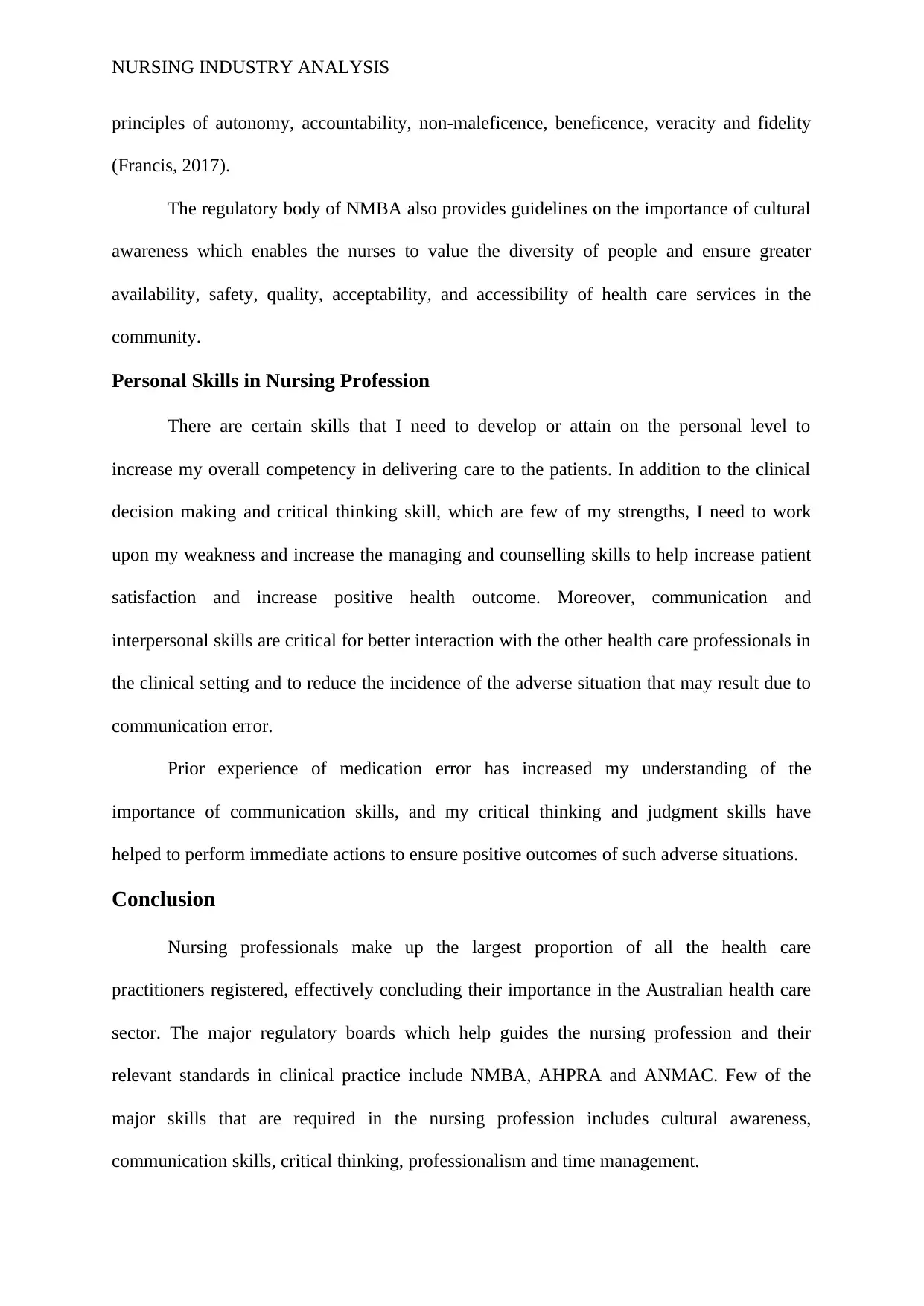
NURSING INDUSTRY ANALYSIS
principles of autonomy, accountability, non-maleficence, beneficence, veracity and fidelity
(Francis, 2017).
The regulatory body of NMBA also provides guidelines on the importance of cultural
awareness which enables the nurses to value the diversity of people and ensure greater
availability, safety, quality, acceptability, and accessibility of health care services in the
community.
Personal Skills in Nursing Profession
There are certain skills that I need to develop or attain on the personal level to
increase my overall competency in delivering care to the patients. In addition to the clinical
decision making and critical thinking skill, which are few of my strengths, I need to work
upon my weakness and increase the managing and counselling skills to help increase patient
satisfaction and increase positive health outcome. Moreover, communication and
interpersonal skills are critical for better interaction with the other health care professionals in
the clinical setting and to reduce the incidence of the adverse situation that may result due to
communication error.
Prior experience of medication error has increased my understanding of the
importance of communication skills, and my critical thinking and judgment skills have
helped to perform immediate actions to ensure positive outcomes of such adverse situations.
Conclusion
Nursing professionals make up the largest proportion of all the health care
practitioners registered, effectively concluding their importance in the Australian health care
sector. The major regulatory boards which help guides the nursing profession and their
relevant standards in clinical practice include NMBA, AHPRA and ANMAC. Few of the
major skills that are required in the nursing profession includes cultural awareness,
communication skills, critical thinking, professionalism and time management.
principles of autonomy, accountability, non-maleficence, beneficence, veracity and fidelity
(Francis, 2017).
The regulatory body of NMBA also provides guidelines on the importance of cultural
awareness which enables the nurses to value the diversity of people and ensure greater
availability, safety, quality, acceptability, and accessibility of health care services in the
community.
Personal Skills in Nursing Profession
There are certain skills that I need to develop or attain on the personal level to
increase my overall competency in delivering care to the patients. In addition to the clinical
decision making and critical thinking skill, which are few of my strengths, I need to work
upon my weakness and increase the managing and counselling skills to help increase patient
satisfaction and increase positive health outcome. Moreover, communication and
interpersonal skills are critical for better interaction with the other health care professionals in
the clinical setting and to reduce the incidence of the adverse situation that may result due to
communication error.
Prior experience of medication error has increased my understanding of the
importance of communication skills, and my critical thinking and judgment skills have
helped to perform immediate actions to ensure positive outcomes of such adverse situations.
Conclusion
Nursing professionals make up the largest proportion of all the health care
practitioners registered, effectively concluding their importance in the Australian health care
sector. The major regulatory boards which help guides the nursing profession and their
relevant standards in clinical practice include NMBA, AHPRA and ANMAC. Few of the
major skills that are required in the nursing profession includes cultural awareness,
communication skills, critical thinking, professionalism and time management.

NURSING INDUSTRY ANALYSIS
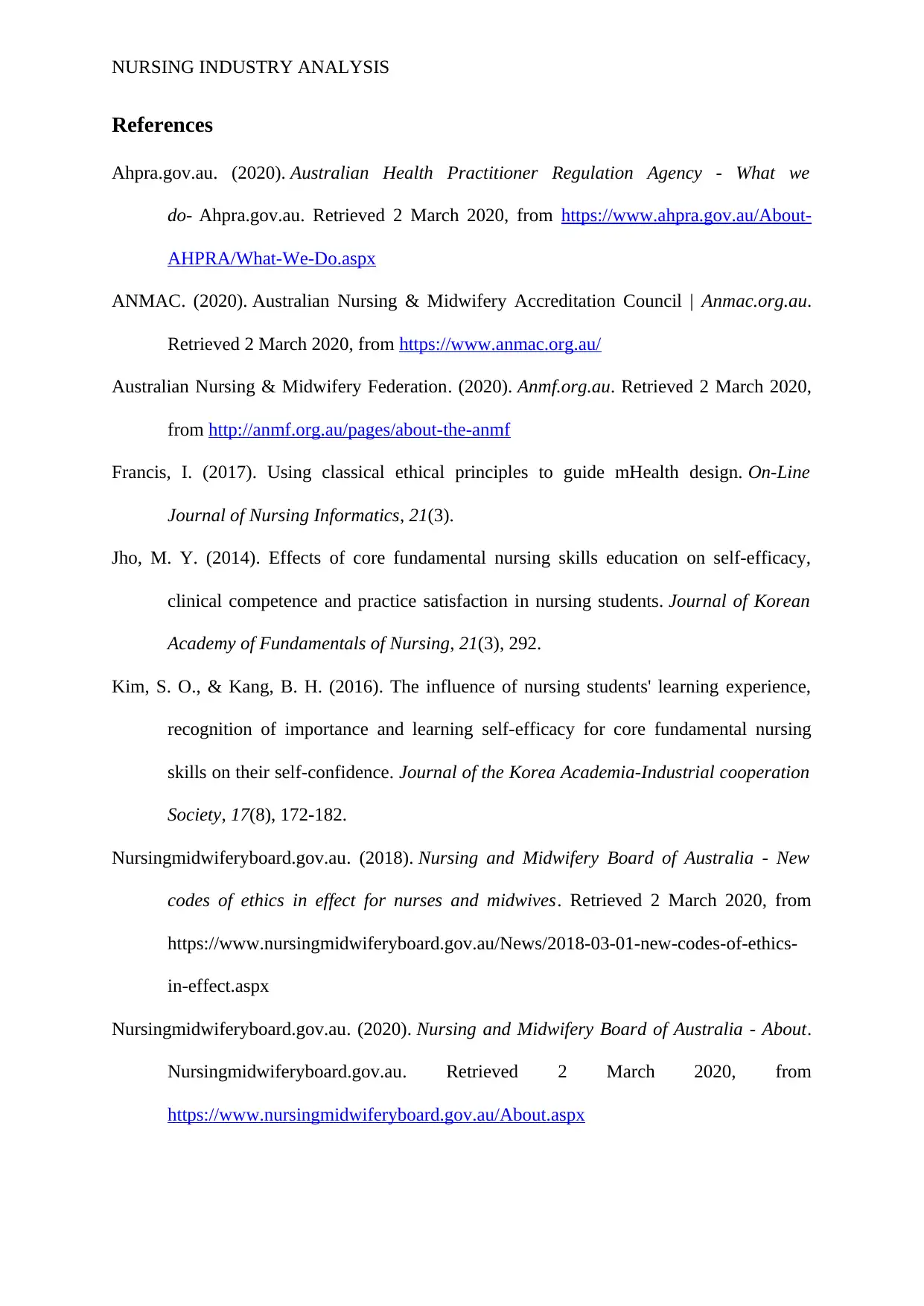
NURSING INDUSTRY ANALYSIS
References
Ahpra.gov.au. (2020). Australian Health Practitioner Regulation Agency - What we
do- Ahpra.gov.au. Retrieved 2 March 2020, from https://www.ahpra.gov.au/About-
AHPRA/What-We-Do.aspx
ANMAC. (2020). Australian Nursing & Midwifery Accreditation Council | Anmac.org.au.
Retrieved 2 March 2020, from https://www.anmac.org.au/
Australian Nursing & Midwifery Federation. (2020). Anmf.org.au. Retrieved 2 March 2020,
from http://anmf.org.au/pages/about-the-anmf
Francis, I. (2017). Using classical ethical principles to guide mHealth design. On-Line
Journal of Nursing Informatics, 21(3).
Jho, M. Y. (2014). Effects of core fundamental nursing skills education on self-efficacy,
clinical competence and practice satisfaction in nursing students. Journal of Korean
Academy of Fundamentals of Nursing, 21(3), 292.
Kim, S. O., & Kang, B. H. (2016). The influence of nursing students' learning experience,
recognition of importance and learning self-efficacy for core fundamental nursing
skills on their self-confidence. Journal of the Korea Academia-Industrial cooperation
Society, 17(8), 172-182.
Nursingmidwiferyboard.gov.au. (2018). Nursing and Midwifery Board of Australia - New
codes of ethics in effect for nurses and midwives. Retrieved 2 March 2020, from
https://www.nursingmidwiferyboard.gov.au/News/2018-03-01-new-codes-of-ethics-
in-effect.aspx
Nursingmidwiferyboard.gov.au. (2020). Nursing and Midwifery Board of Australia - About.
Nursingmidwiferyboard.gov.au. Retrieved 2 March 2020, from
https://www.nursingmidwiferyboard.gov.au/About.aspx
References
Ahpra.gov.au. (2020). Australian Health Practitioner Regulation Agency - What we
do- Ahpra.gov.au. Retrieved 2 March 2020, from https://www.ahpra.gov.au/About-
AHPRA/What-We-Do.aspx
ANMAC. (2020). Australian Nursing & Midwifery Accreditation Council | Anmac.org.au.
Retrieved 2 March 2020, from https://www.anmac.org.au/
Australian Nursing & Midwifery Federation. (2020). Anmf.org.au. Retrieved 2 March 2020,
from http://anmf.org.au/pages/about-the-anmf
Francis, I. (2017). Using classical ethical principles to guide mHealth design. On-Line
Journal of Nursing Informatics, 21(3).
Jho, M. Y. (2014). Effects of core fundamental nursing skills education on self-efficacy,
clinical competence and practice satisfaction in nursing students. Journal of Korean
Academy of Fundamentals of Nursing, 21(3), 292.
Kim, S. O., & Kang, B. H. (2016). The influence of nursing students' learning experience,
recognition of importance and learning self-efficacy for core fundamental nursing
skills on their self-confidence. Journal of the Korea Academia-Industrial cooperation
Society, 17(8), 172-182.
Nursingmidwiferyboard.gov.au. (2018). Nursing and Midwifery Board of Australia - New
codes of ethics in effect for nurses and midwives. Retrieved 2 March 2020, from
https://www.nursingmidwiferyboard.gov.au/News/2018-03-01-new-codes-of-ethics-
in-effect.aspx
Nursingmidwiferyboard.gov.au. (2020). Nursing and Midwifery Board of Australia - About.
Nursingmidwiferyboard.gov.au. Retrieved 2 March 2020, from
https://www.nursingmidwiferyboard.gov.au/About.aspx
Paraphrase This Document
Need a fresh take? Get an instant paraphrase of this document with our AI Paraphraser
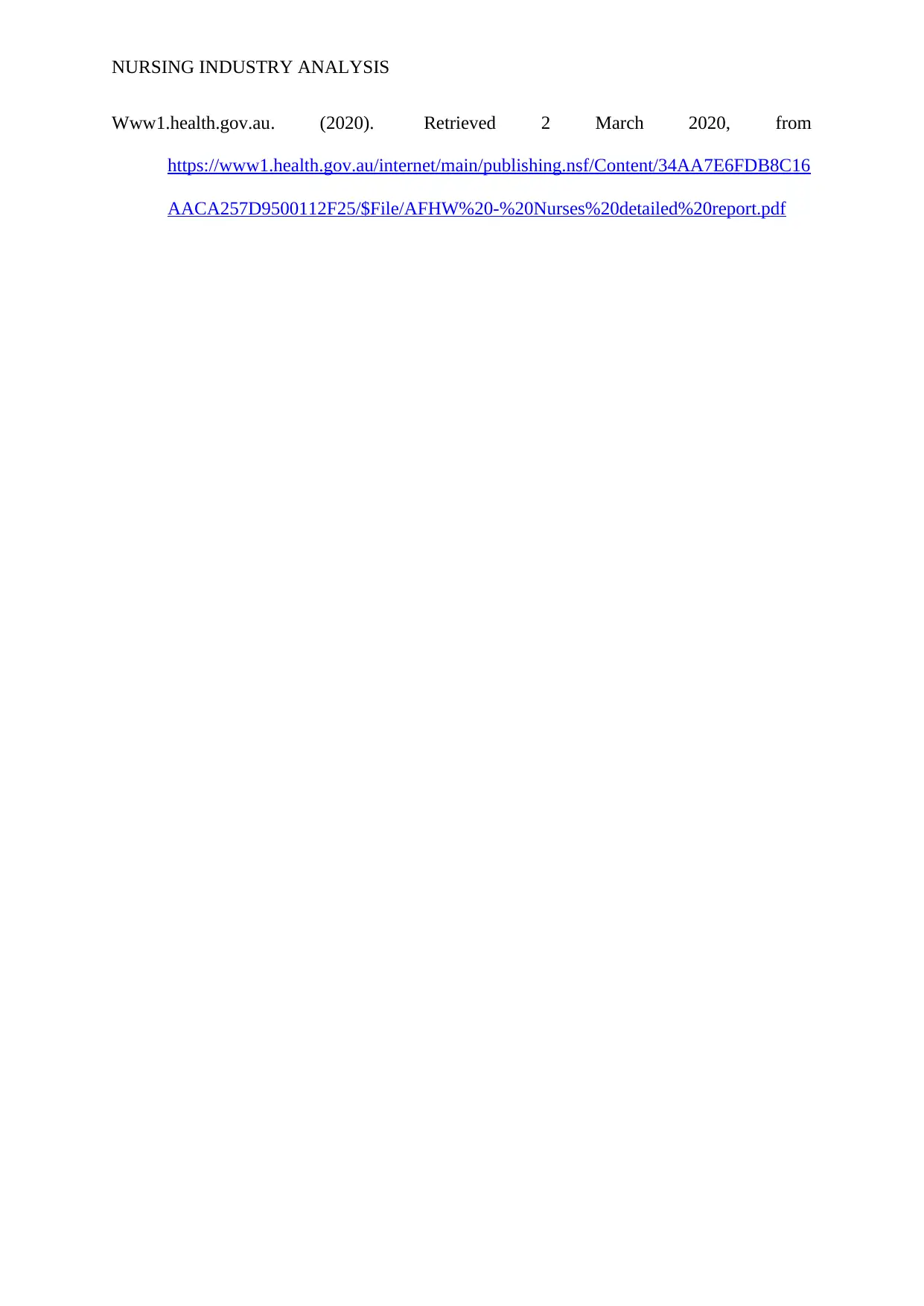
NURSING INDUSTRY ANALYSIS
Www1.health.gov.au. (2020). Retrieved 2 March 2020, from
https://www1.health.gov.au/internet/main/publishing.nsf/Content/34AA7E6FDB8C16
AACA257D9500112F25/$File/AFHW%20-%20Nurses%20detailed%20report.pdf
Www1.health.gov.au. (2020). Retrieved 2 March 2020, from
https://www1.health.gov.au/internet/main/publishing.nsf/Content/34AA7E6FDB8C16
AACA257D9500112F25/$File/AFHW%20-%20Nurses%20detailed%20report.pdf
1 out of 8
Related Documents
Your All-in-One AI-Powered Toolkit for Academic Success.
+13062052269
info@desklib.com
Available 24*7 on WhatsApp / Email
![[object Object]](/_next/static/media/star-bottom.7253800d.svg)
Unlock your academic potential
© 2024 | Zucol Services PVT LTD | All rights reserved.





